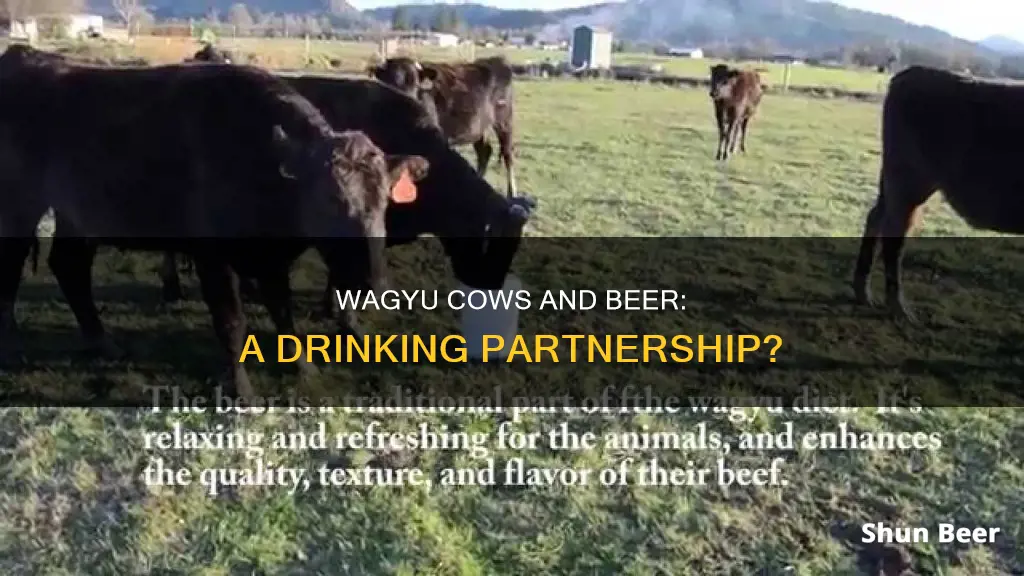
There are many rumours and misconceptions about the famous Wagyu cows from Japan, one of the most popular being that they are fed beer to stimulate their appetite. While this myth is largely unfounded, there is a small grain of truth to it.
Wagyu cows are renowned for producing some of the most expensive and sought-after beef in the world, so it's no surprise that their treatment and diet are subject to much speculation.
| Characteristics | Values |
|---|---|
| Do Wagyu cows drink beer? | There is a myth that Wagyu cows drink beer. However, this is not a common practice among Wagyu farmers. |
| Why do they drink beer? | To stimulate their appetite and improve marbling. |
| Where did the myth come from? | A mistranslation of "sake lees", a byproduct of the sake-making process that is mixed with feed and given to cows as a supplement, into "beer". |
| Is there any truth to the myth? | Some farmers in Japan and Wales give their cows small amounts of beer, wine, or sake. |
| Why do farmers give them alcohol? | To calm them down and reduce stress and anxiety levels. |
| Is it effective? | There is evidence that alcohol can improve beef quality, but it is not proven and may increase stress levels in cows. |
What You'll Learn

The origins of the Wagyu beer myth
There are several rumours and misconceptions surrounding the production of Wagyu beef, one of the most expensive cuts of meat in the world. One such tale is the myth that Wagyu cows drink beer. While this is not true, there is a grain of truth to the myth.
Wagyu cows are often raised in small herds and given a lot of individual attention. Farmers ensure their cows are well-fed and healthy, and are given plenty of space to roam and graze, which helps to reduce stress and improve their overall well-being. In Japan, where space is limited, some farmers also massage their cows to improve their muscle tone and prevent cramps and seizures during the winter.
The beer myth likely originated from a few isolated incidents where farmers in Japan gave their cows small amounts of beer or sake lees (a byproduct of sake production) to increase their appetite, especially during the winter months. It was believed that this improved the marbling of the meat. However, this practice was never widespread and is not a common or standard practice among Wagyu farmers today.
Some media coverage of this 'small number' of farmers may have contributed to the spread of the myth, with a focus on disseminating high-impact information. Additionally, there may have been a mistranslation of the term "sake lees" into English, where it was referred to as "beer" in some articles.
Despite the myth being largely unfounded, there is some evidence that a small amount of alcohol can have a positive effect on beef quality. A study by the National Institute of Livestock and Grassland Science in Japan found that cows given a small amount of beer had higher levels of umami, the savoury flavour characteristic of high-quality beef. However, this does not mean that feeding cows large amounts of beer would have any beneficial effects.
Pumping and Drinking: Can Beer Affect Breast Milk?
You may want to see also

Wagyu cows and the Japanese tradition
Wagyu cows are synonymous with luxury and quality, and their meat is highly sought-after by chefs and food enthusiasts worldwide. The origins of these cows can be traced back to Japan, where the term "wagyu" refers to four native breeds: Japanese Black, Japanese Brown, Japanese Shorthorn, and Japanese Polled. The proper care and respect for these cows is deeply rooted in Japanese tradition, and farmers go to great lengths to ensure their well-being and health.
Wagyu cows are often raised in small herds, given individual attention, and provided with a carefully balanced diet that includes grass, hay, and other feed. They are typically allowed to roam and graze freely, reducing their stress levels and improving their overall health. This natural lifestyle, combined with their unique genetics, contributes to the exceptional flavour and texture of wagyu beef.
One popular rumour surrounding wagyu cows is that they are given beer to drink. While it is true that some farmers in Japan and other parts of the world have given their cows beer, it is not a standard or widespread practice. The origin of this rumour may lie in a mistranslation, as Japanese farmers sometimes feed their cows ""sake lees," a byproduct of the sake-making process. This practice, when translated into English, may have been misinterpreted as giving cows beer.
Nevertheless, there is some scientific evidence to suggest that a small amount of beer can enhance the quality of beef. A study by the National Institute of Livestock and Grassland Science in Japan found that cows fed a small quantity of beer had higher levels of umami, the savoury flavour characteristic of high-quality beef. However, it is important to note that this study used very small amounts of beer, and there is no evidence that larger amounts would provide any additional benefits.
In conclusion, while the rumour of wagyu cows drinking beer may have some basis in reality, it is not a common practice among Japanese farmers. The reputation of wagyu beef is built on the meticulous care, attention, and respect given to these cows, as well as their unique genetics and natural diet. The result is a premium product that is celebrated for its flavour, texture, and health benefits.
Post-Massage Beer: Is It Safe to Drink Alcohol?
You may want to see also

How the beer myth started
The idea that wagyu cows drink beer is a myth, but it is a pervasive one. So, how did it start?
Many believe the myth started as a result of a mistranslation. In Japan, there is a beverage called "sake lees" which is a byproduct of the sake-making process. Farmers sometimes mix this with feed and give it to cows as a supplement. However, when this practice was translated into English, some articles mistakenly referred to sake lees as "beer".
It is true that some Japanese farmers do give their cows beer, but this is a very small number. The Kobe Beef Marketing & Distribution Promotion Association commented that there may be some farms rearing small numbers of cattle in this way, but this is not standard practice for producing prime Kobe beef.
The Matsuzaka wagyu cattle farmer is said to have started the practice of giving cows beer. Some media outlets picked up on this and, keen to disseminate high-impact information, reported it as if it were common practice.
Another factor contributing to the spread of the myth is the traditional Japanese belief that cows were fed beer to stimulate their appetite in hot weather. This belief has been adopted and adapted by some farmers outside of Japan, who give their cows beer as part of their daily finishing ration.
Bottoms Up Beer: How Does This Novelty Work?
You may want to see also

The truth about Wagyu cows and beer
There are many rumours and misconceptions about Wagyu cows, one of the most popular being that they drink beer. While the idea of cows enjoying a cold beer on a hot day is certainly amusing, it is largely a myth.
Wagyu cows are a Japanese breed, and the name 'Wagyu' means 'Japanese cow'. Wagyu farming is steeped in Japanese tradition, and farmers take great care to ensure their cows are healthy and well-fed, as this directly impacts the quality of their beef. Wagyu cows are typically raised in small herds and given a lot of individual attention. They are often massaged to improve muscle tone and reduce stress, and are given plenty of space to roam and graze.
The rumour that Wagyu cows drink beer likely originated from a few isolated incidents where Japanese farmers gave their cows small amounts of beer or sake to increase their appetite, especially during the winter months. It is important to note that this practice is not widespread and is not a standard feeding requirement. Most Wagyu farmers focus on providing their cows with a balanced diet of high-quality feed, water, and vitamins, carefully monitoring their health and nutrition to ensure the best possible meat.
Some farmers have also experimented with giving their cows small amounts of sake or wine to calm them down and reduce stress and anxiety levels, which can lead to higher-quality beef. However, this practice is not common and may not be scientifically proven. There is evidence that alcohol can increase stress levels in cows, leading to lower-quality meat.
While beer may not be a regular part of a Wagyu cow's diet, it is clear that Wagyu farmers go to great lengths to ensure their cows are healthy and happy. This includes providing a stress-free environment, a carefully balanced diet, and plenty of space to roam, resulting in the high-quality, luxurious meat that Wagyu cows are known for.
Beer and Milkshakes: Mixing Drinks, Safe or Not?
You may want to see also

The real purpose of beer in Wagyu farming
While it is true that some farmers give beer to their wagyu cows, it is a very small number. The rumour that wagyu cows drink beer likely originated from a few isolated incidents and a mistranslation. In reality, most wagyu farmers are focused on creating a stress-free living environment for their cows, and providing them with a balanced diet of high-quality feed, water, and vitamins.
The beer rumour likely started because some Japanese farmers give their cows "sake lees", a byproduct of the sake-making process, as a supplement mixed with feed. When this practice was translated into English, some articles mistakenly referred to it as "beer". Additionally, some Japanese farmers have given their cows beer to increase their appetite, especially during the winter months. However, this is not a standard practice and is not a feeding requirement.
There is also some evidence that alcohol can have a positive effect on beef quality. A study by the National Institute of Livestock and Grassland Science in Japan found that cows given a small amount of beer had higher levels of umami, the savoury flavour characteristic of high-quality beef. However, the amount of beer given to the cows was very small, and there is no evidence that larger amounts would have any benefit.
Some farmers have experimented with giving their cows small amounts of sake or wine to calm them down, as it is believed that alcohol can help reduce stress and anxiety levels in cows, which can lead to higher-quality beef. However, this practice is not common and may not be scientifically proven. In fact, some experts argue that alcohol can increase stress levels in cows and lead to lower-quality meat.
In conclusion, while beer may not be a staple of the wagyu diet, there is some evidence that alcohol can be beneficial to cows in small amounts. However, the role of alcohol in producing high-quality wagyu beef is still up for debate, and most farmers focus on providing their cows with a balanced diet and a stress-free environment to ensure the best possible meat.
Japanese Beer Cups: The Science Behind the Froth
You may want to see also
Frequently asked questions
It is a myth that all wagyu cows drink beer. While some farmers in Japan and Wales have given their cows beer, it is not a common practice.
Some farmers give wagyu cows beer to increase their appetite, especially during the winter months.
Some people believe that it is unethical to give cows beer, especially for Muslims who are concerned about consuming wagyu beef.
The cows at the Ba Vi Cow and Pasture Research Center in Hanoi drink beer and wine. One farmer in Wales gives his wagyu cows beer from his local brewery.
There is no evidence to suggest that wagyu cows get drunk from drinking beer. The amount of beer given to the cows is usually very small.







